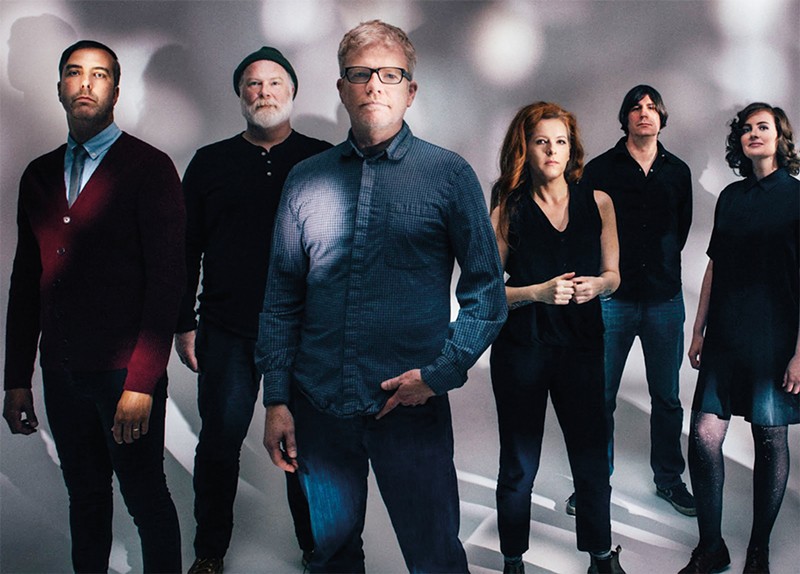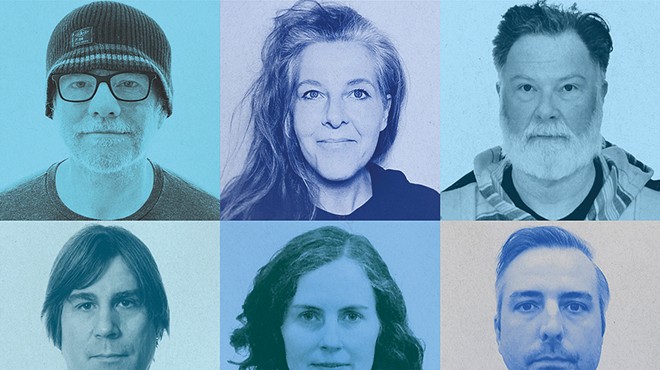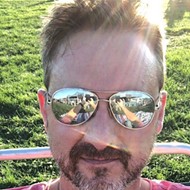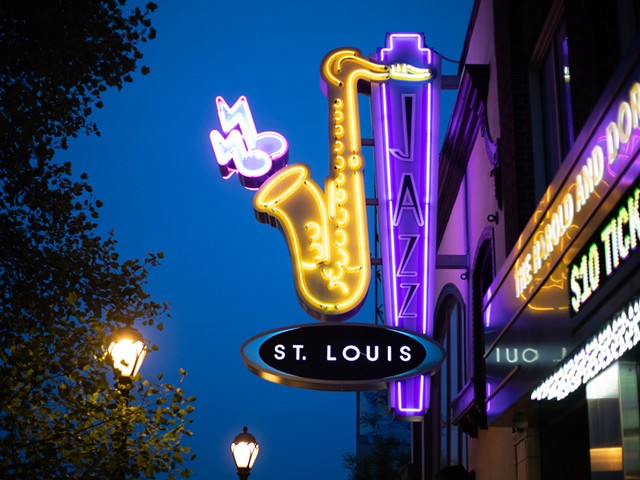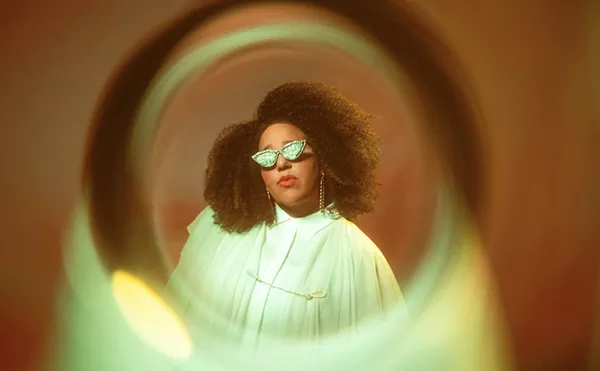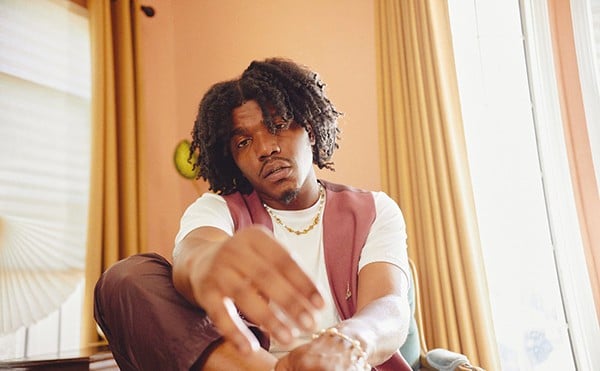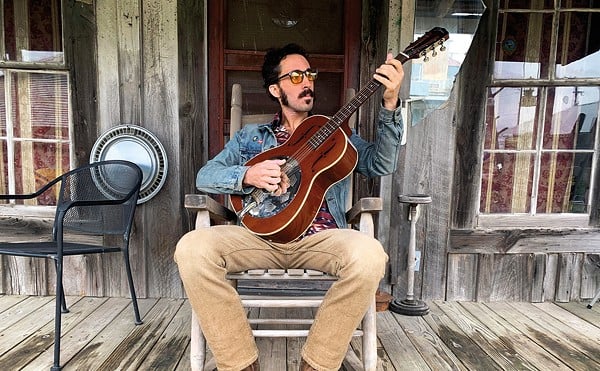A. C. Newman, leader of indie-rock luminaries the New Pornographers, is enjoying the bucolic life. A few years ago, Newman and his wife ditched their apartment in New York City and moved upstate to Woodstock, where Newman is preparing for the New Pornographers' album release and U.S. tour, which includes a stop at the Sheldon on April 27.
"Woodstock is kind of a bubble within a bubble within a bubble," Newman says. "Maybe St. Louis is the same way."
He is talking about being in a socio-political blue island surrounded by a sea of red counties. As an affable, talky fellow, Newman breaks that topic down further, spending the first part of our chat detailing the differences between Woodstock and Bethel, where the 1969 Woodstock festival actually took place.
Newman, however, is no New York native. He was born and raised in Vancouver, where he co-founded the New Pornographers in 1997. Now, the geographically scattered band members, including American siren Neko Case and bassist/producer John Collins, have recorded nine lauded albums.
Having passed the 25-year mark, the New Pornographers enjoy an impassioned following, owing to an extensive catalog of off-kilter power pop typified by multi-layered melodic sugar, quirky sonic embellishments, co-ed vocals and Newman's distinctive, cracked poetry.
In 2021, the Pornographers took a sort of victory lap with a tour playing two classic albums — 2000's Mass Romantic and 2005's Twin Cinema — in full. That served as something of a palate cleanser ahead of an excellently eclectic new album, Continue as a Guest.
On the phone from Woodstock, Newman chatted about the new album, new ways of writing and singing, and the upcoming tour.
This interview has been edited for clarity and length.
Let's talk about the new album. What was the recording process like during the pandemic?
I did a lot of it at home. Almost everybody in the band has a way to record at home. I think for us, recording during the pandemic was not so strange. There's always been that element of wondering how we are going to get together. Except in the past, it wasn't a pandemic keeping us apart — it was just life in general.
How do the songs come together in terms of instrumental and vocal arrangements?
It's kind of random. With vocals, I don't really write for anybody. I have a tendency to write melodies that are kind of all over the place, so it gets really high at points and low at points. So it just made sense that, OK, I'm the male voice, so I'll do the low part, and Kathyrn or Neko or Nora [O'Connor] will do the high parts. That's basically what we've done. But there's no method. I haven't figured out a formula yet. I just go in and start working until it feels right. I can't think of any other way to do it.
Are you the one directing traffic when it comes to putting the arrangements together?
Yeah. I usually have a lot of the vocals mapped out. If I don't, I just say, "Just sing whatever you feel like singing here." If it works, that's awesome. If it doesn't, we don't use it. It's the same thing with arranging the songs. I would send the songs to Kathryn or Todd or John, and they would just send me back a bunch of ideas — knowing that I wouldn't use all of them. They'd send me five things for a song, and I'd use the one that I thought worked. That's great because it kind of replicates the feeling of being together and experimenting except we're not all in the same room at the time.
Did the pandemic end up informing the new album?
I think the main way it informed the record was lyrically, the themes in it. It was hard to write about anything other than the pandemic. A lot of things seemed unimportant. Like, the first song I wrote lyrics for on the record was "Marie and the Undersea," and I felt really stuck with writing lyrics because I didn't know how I could write about anything that is not what is going on right now. Like, how can I pretend this is not going on and write a love song or write a song like, "Boo-hoo, my heart is broken?" So with "Marie and the Undersea," I decided to write about somebody that is not me. I had been reading about nurses working 24-7 in emergency rooms because of COVID, and I thought, "I'm going to write about this person."
Had you done that kind of third-person writing much before?
No, not at all. I think it helped me get out of a block because I realized that getting out of myself felt like a release. This is a song that's not about me. It's about someone else. Then, of course, when I continued from there, my own self slipped in everywhere because it's hard not to be sort of solipsistic when writing pop music — or doing anything really. But it did make me think, "I like this, and I want to write this way."
Is theme something you think about, or does it develop while making an album? Or has a cohesive theme not been that important to you?
I don't think I've ever been super concerned about the overall theme. Occasionally things have crept in. Like, sometimes there would be four or five songs on a record that would have a similar vibe and theme, and then the other seven songs don't.
I've never really wanted to make a concept record, but I've been thinking about it more because it's something I've never done. When you've been playing and writing music for a long time, you try to figure out a new way to do what you do and keep yourself entertained. I mean, to write songs that tell stories in the third person — everybody does that. It's what so many classic songwriters have done, but for me it feels kind of new. For me, it's experimental on a personal level even though on a macro level it's not at all.
Do you consider Continue as a Guest a concept album?
I think there are themes that came out from writing during the pandemic. Just the fact that it's called Continue as a Guest, which is something you always see when you're buying something online. It's about how our lives are tied into being online and how it connects us and isolates us the way that COVID isolated us. When you're out in your house in Woodstock during a pandemic, you feel very outside of society, and you start asking yourself if this is a good place to be. How connected do I want to be to things, and how much do I want to just ride off into the sunset?
How about sonically or compositionally? Is there anything you'd consider a departure for the band?
I think there are songs on this record that sound very new for us. Like I think the title track has a very different vibe from anything we've done. Or like the second song, "Pontius Pilate's Home Movies." Because we're going on tour, we've been working out how to play the songs, and I was noticing that that song doesn't have any keyboards. Like, is this the first song we've ever put out that has no keyboards? It's got two bass guitars, a mandolin, a saxophone. That is a different setup for us.
I'm digging the presence of the saxophone on this album.
That's Zach Djanikian. He's a jazz guy. He's one of those guys who didn't start listening to pop music until he was like 18. I was playing him "Love Plus One" by Haircut 100, and it blew his mind. He was like, "What? I've never heard this." I was like, "Yeah, it's cool New Wave pop. There's tons of it, Zach."
How did Zach get involved on the record?
I've known Zach for years, and he's just a really great musician. Even though we can do a lot of long-distance stuff with the band, I wanted somebody here with me. I wanted a great musician and sounding board, so that's why I asked Zach. He had the soprano sax, tenor sax, alto sax. Soprano sax is a fun one to use. The song "Angelcover" — the main little melodic hook at the beginning of that is two soprano saxes — and that was fun.
I was listening to "Last and Beautiful" the other day, and my daughter thought a dog was barking outside, but it was something in the song.
That's me making that sound! I was thinking of like old Ennio Morricone stuff from spaghetti westerns, like someone just makes these weird yelping sounds. Serge Gainsbourg also did it. I like that thing where someone would make a weird sound. If you go back and listen to some of that old classic Ennio Morricome, there's a lot of that. It's a classic example of something you might do in the studio by yourself that you probably wouldn't do if someone else was around. But then the idea was to take that sound and put it through so many effects that you can't tell what it is.
Your vocal performance seems to have evolved this time out.
I think I was just trying to be more of a crooner on this record and less precious about melodies. I used to be really into the idea of composing melodies — the part of me that was really into Bacharach and David. I felt like, "This is the melody, and we have to sing it exactly like this." Now I feel like the melody is much more malleable and look to see if there are any notes I can move around to make it more fluid or smoother. Again, it's probably something all singers have been doing throughout history, but for me it's kind of new. If something's not working, instead of re-singing and re-singing, I just say, well, maybe the melody should change. That felt new.
What are you most looking forward to on this tour?
I'm just excited to play the new songs. I put on the record last night to take notes, and I was like, "This is going to be cool." When you haven't toured in a while, you have to get together and figure out how to be yourself again and how to play your own album. So that feels like a challenge, and I'm looking forward to it.
The New Pornographers play The Sheldon Concert Hall (3648 Washington Avenue, 314-533-9900, thesheldon.org), at 8 p.m. on Thursday, April 27. Tickets are $39 to $56.
Coming soon: Riverfront Times Daily newsletter. We’ll send you a handful of interesting St. Louis stories every morning. Subscribe now to not miss a thing.Follow us: Google News | NewsBreak | Reddit | Instagram | Facebook | Twitter

